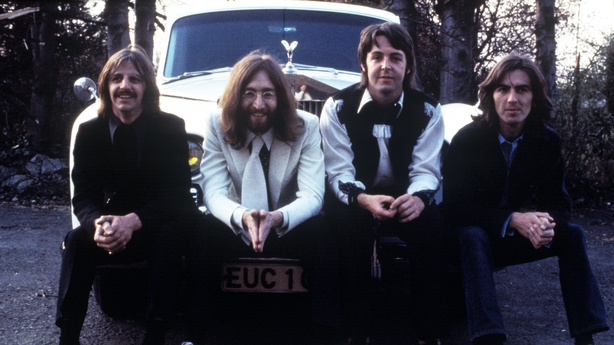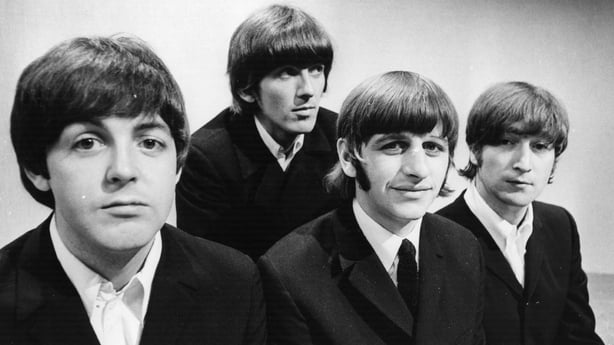Tears. That was the first reaction of many people when The Beatles released Now and Then, their first "new" song in nearly thirty years and a full 53 years after they finally and fatefully broke up.
It all came rushing back - the hope, the innocence, the heady scent of revolution in the air, and yes, the love that the Beatles era evoked, an assault of memories that still calls down through the generations.
Now and Then has also arrived in the midst of war and imminent climate collapse and that has made this simple but haunting song all the more powerful and affecting.
So, who can blame us, well a lot of us, for taking a crumb of comfort from listening to something new from the greatest band of all time?
Say what you want about the actual song (and I will shortly) but this is a moment that crystallises what The Beatles still mean to so many, many people and why they are still so very important.
As one American fan interviewed in the audience at a Beatles gig in 1964 hyperventilated: "I love The Beatles, I will always love them. I'll love them when I’m 105."
Such is the ineluctable hold of four men who stopped making magic together more than half a century ago. Because let’s not forget that right from the very start, The Beatles were so much more than a mere band.
The way their music, look and attitude has seeped into the collective psyche and culture is more akin to a religion - something that John Lennon innocently remarked upon as far back as 1966.
And as one Larry Kane, news director of Miami station WFUN, once asked, "The biggest question in 1964 was when was the Beatle bubble going to burst?" Well, we’re still waiting.
Now and Then arrives just two weeks after The Rolling Stones released a new and very good album, a realigning of the stars which will either illicit a dislocating sense of déjà vu or maybe underline the artistic bankruptcy of so many new acts.

Of course, cynics have dismissed this new song from the Fabs as a money grab and not McCartney (net worth: £800 million) paying a final fond farewell to old friends and perhaps, y’know, trying to spread a bit of love.
Then again, the price of this latest piece of Beatles ephemera will also make your eyes water for entirely different reasons. Depending on what colour vinyl you fancy, it’s priced between €15.95 and €20.00 and when the 50th anniversary reissues of the Red and Blue albums hit the racks next week, they’ll be around €50 a pop and crackle.
What would otherwise sound mawkish (after all, Lennon is the man who penned Imagine, the worse song ever), now takes on a whole new meaning.
So how does Now and Then fit into the 229 songs the band officially released? Well, first things first – it’s a damn sight better than Free As a Bird (a No 5 hit in Ireland) and Real Love (a No 8 hit in Ireland), the two songs salvaged from old Lennon demos which were a selling point for 1995’s otherwise excellent if slightly hagiographic Anthology TV series.
However, my heart and hopes sank when rumours began percolating that the new song had been coaxed into life with the assistance of the new bogeyman/Dr Frankenstein of Artificial Intelligence, a scarily seductive technology that has so far proved its worth by cooking up a deepfake Oasis song that sounds only slightly worse than actual Oasis.
Now and Then went through an even more torturous process than those two other Lennon outtakes that were dusted down for Anthology.
Apparently, the tape containing Lennon’s scratchy takes of Real Love, Free as a Bird and Now and Then was handed to McCartney by Yoko Ono at the Rock and Roll Hall of Fame in 1994. It was originally destined to become the third single release from Anthology but confounded by technological limitations and cranky old George’s insistence that the song wasn’t worth saving, it was shelved until now.
Empathically billed as The Beatles last song, Now and Then’s lyrics certainly take on a tear-duct bothering poignancy and real tenderness. Back in 1978, Lennon, still living in semi-reclusiveness in the Dakota Building in New York, sings into a recording machine:
"I miss you
Oh, now and then
I want you to be there for me
Always to return to me."
He would be dead within two years.
John and Paul had tentatively begun rebuilding their shattered relationship several years previously so Lennon’s sentimental and longing words about a lost love are hard to resist. It is a song about the inevitability of the passage of time and what would otherwise sound mawkish (after all, Lennon is the man who penned Imagine, the worst song ever), now takes on a whole new meaning.
Now and Then is, as they say, a grower. After a count-in from McCartney, the song blooms into stately life with Lennon’s halting and careworn vocal and a yearning slide guitar solo of decidedly Harrison vintage.
With John on lead vocals, electric and acoustic guitar recorded in 1995 by George, new drums from Ringo and bass, guitar and piano from Paul, the new song also features a suitably lysergic string arrangement and backing vocals from the original recordings of Eleanor Rigby and Here There and Everywhere and Because.

The reaction to the song has been mixed to say the least. Beatles biographer Philip Norman, who is about to release his new book on George Harrison, was less than impressed, branding Now and Then "utterly dreadful" and sounding like "a castoff from an ELO album".
Sadly, Ian MacDonald, the music scholar who wrote the indispensable Revolution In The Head: The Beatles Records And The Sixties, is no longer around to deconstruct the new song and divine its place in the Beatles canon but I’m guessing that he may have been rather sniffy about the whole endeavour.
Writing about the rebooted Beatles of the 1990s in the updated version of Revolution In The Head in 1997, he lamented, "The Beatles’ post-Beatles story is, on the whole, unedifying. Most Beatles fans will be restless until they own these discs but they are unlikely to take them off their shelves very often."

The lesson here seems to be that just because you can somehow piece together a new Beatles song using technology and studio trickery it doesn’t mean you should. Hopefully, this is indeed the last Beatles song and the band’s technologic afterlife is now over.
But The Beatles can never just let it be. Now and Then is just the latest new way to tell the greatest rock `n’ roll story ever told. In recent years we’ve had fresh stereo mixes of Sgt Pepper and Revolver, and director Peter Jackson’s jaw dropping reboot of the Get Back movie and the Abbey Road and Let it Be sessions. An 80-year-old McCartney headlined Glastonbury last year.
It seems that a mild case of Beatlemania still grips the world. Next week, those 50th anniversary editions of the Red and Blue albums are released with extra tracks, while next Tuesday marks 60 years since The Beatles played their only ever Irish concerts.
To which we can only say yeah, yeah, yeah! Because with a little technology and a lot of love, now as then, The Beatles continue to make a scary world a little more fab.
Alan Corr @CorrAlan
PS: I'm not crying. You're crying!


